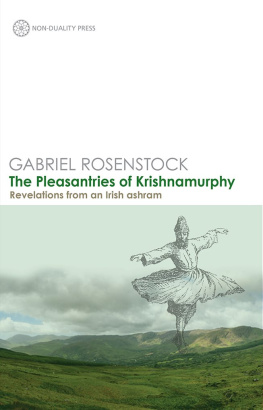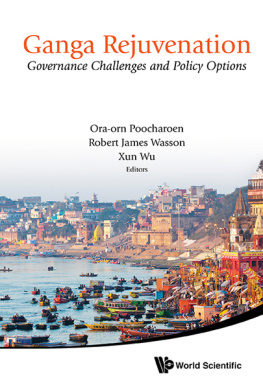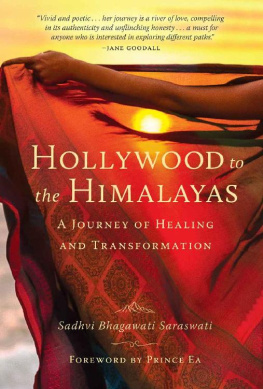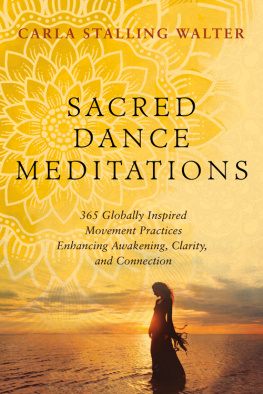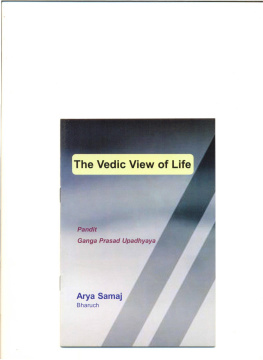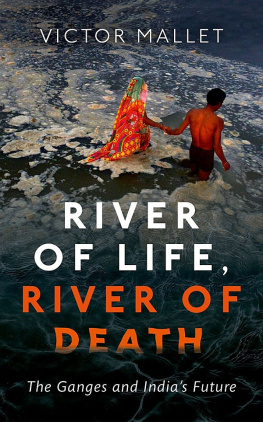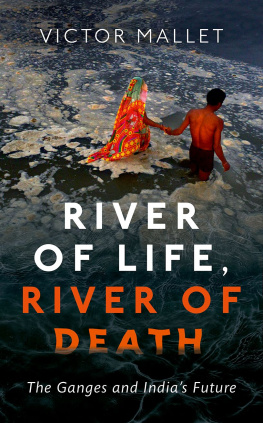Sadhvi Bhagawati Saraswati lives and teaches at the Parmarth Niketan Ashram on the banks of the Ganga. She is a graduate of Stanford University and holds a PhD in psychology. She is also vice-chair of the United Nations Faith Advisory Council on Religion. She spearheads many social development projects as secretary-general of the Global Interfaith WASH Alliance and president of the Divine Shakti Foundation.
Introduction
I vividly remember the first satsang I gave. It was about thirteen or fourteen years ago. I had been in India for ten or eleven years by that point, living, doing sadhana and seva at Parmarth Niketan Ashram in Rishikesh under the guidance and blessings of my guru, Pujya Swami Chidanand Saraswatiji. One evening, we were gathered in Pujya Swamijis jyopri , the bamboo and gobar (cow dung) hut in his garden, following the Ganga aarti ceremony on the banks of the sacred river. Gathering together after the aarti was a near-daily ritual. His garden door was open to anyone seeking darshan, blessings or our involvement and assistance in a charitable project. Or, frequently, it was a time for people to ask spiritual questions.
That evening, there was a group from America, and one of them asked a question about anger and forgiveness. Pujya Swamiji turned to me and said, Sadhviji. I waited to hear the rest of the sentence. I expected him to give me some instruction, say, Sadhviji, please ask the boy to bring books for this group. So, I waited. But no further instruction came. It was just Sadhviji. I turned to Pujya Swamiji. His eyes were now closed, and his hands were in dhyana mudra upon his knees. Suddenly, I realized he wanted me to answer the question. I panicked.
I had already been doing a lot of public speaking, particularly about Indian culture, on tours for the Encyclopedia of Hinduism project and at Hindu temples and events. However, those were situations where I knew in advance that I was going to have to give a lecture. I usually had some time, even if it were just ten minutes on the stage when Pujya Swamiji would signal to me, You will also speak. But here, there was no time to even gather my thoughts.
I closed my eyes and tried to recollect all the knowledge I had about anger and forgiveness. I regularly wrote articles for Pujya Swamiji and had written several on the subject of emotions and the importance of forgiving, forgetting and moving forward. So the topic wasnt new, but I still needed a while to organize my ideas and thoughts. I tried to sift through the index cards stored away in my mind. Growing up, when I had written papers for schoolwork or studied for exams, my parents had taught me to use 3x5-inch index cards to put topics, ideas and points in systematic order. It worked beautifully. However, that method was not coming in handy now. I could not arrange the cards in my brain quickly enough.
I squeezed my eyes shut tightly, praying in the way children do, to somehow make this group of people go away. Maybe if I just stayed still like that and prayed very hard, this whole embarrassing situation would turn out to be an illusion. I opened my eyes. The group was still sitting there, staring at me expectantly. I looked again at Pujya Swamiji. His eyes remained closed, and he was deep in meditation. He was not going to rescue me from the deep ocean into which he had just thrown me.
I closed my eyes once more, this time not to make the people disappear but in full, humble surrender. I spoke to Pujya Swamiji silently in my mind. I told him, Im so sorry. I dont have it in me. I dont know what to tell these people. I dont know the answer. I am so sorry to disappoint you. I dont have it in me.
As I gently opened my eyes, fully prepared to face my own shame in the eyes of the eagerly waiting group, my mouth also opened slowly and, from somewhere other than my own brain, out flowed the answer. I spoke and spoke to them, and tears filled their eyes and rolled down their cheeks.
From that first satsang, till today, nearly fifteen years later, the truth is the same. I dont know the answer. It is not in me. However, through the grace of God and the blessings of Pujya Swamiji, the answers come through me. What each person needs to hear at a given time and in a particular way simply flows through me, due to no merit of my own. To be used as a vessel, as a vehicle for this flow of graceful wisdom is the greatest blessing in my life.
For more than ten years now, each evening, following the sacred Ganga aarti, I give satsang. People ask questions in person or send them in advance by email or via social media. I am humbled every evening by the gratitude in the eyes of the audience. I am deeply aware that, as they are grateful to me for being the vehicle of wisdom, so am I grateful to God for blessing me with the opportunity to be this vehicle.
Satsang literally means in the Presence of Truth. It is a time of delving deep into the truth of who we are and, of course, who we are not. The ignorance of our false identification with the body, the ego, our roles and identities is what leads to our suffering. If we can free ourselves from this ignorance by diving deep into the truth, we can learn to live in joy, peace and light. We can even, if our practice is deep and dedicated enough, attain that divine state of self-realization, enlightenment or moksha, freedom, which is ultimately the goal of our life.
The pages of this book are filled with direct transcriptions of answers from the satsangs Ive given over the years, lovingly transcribed and organized by Shanti Laughtin and edited by my fantastic editor at Penguin, Roshini Dadlani.
As you read them, do not peruse them as you would a textbook. These are not just teachings which we can read and say oh wow and then forget all about them, have dinner, fight with our family, watch TV and go to sleep. These are teachings for how we should live.
Let the words carry you to the banks of Mother Ganga in Rishikesh, and to the source of truth within yourself. The truth of which I speak in my satsangs is the truth within all of us.
From Hollywood to Holy Woods
How did you end up in India, taking sanyas ? What has living in India taught you?
Most people go to India seeking enlightenment, or at least advanced yoga studies. I went because I liked the food. Twenty years ago, I had graduated from Stanford and was doing my PhD in psychology, with only my dissertation pending. It was time for a travel break. I agreed to go to India, a place I knew nothing about, only because I was a staunch vegetarian. In India, I knew I wouldnt have to grill waiters in languages I didnt speak about whether there was chicken broth in their vegetable soup.
I was not religious. I was not even one of those people who say, Well, Im not religious, but Im spiritual. I had a bat mitzvah to make my grandparents happy. It was just what you did. I was an academic and a hippie. If anyone ever said you couldnt dance all night on Saturday at a Grateful Dead show and still ace a neuro-psychology exam on Monday morning, I would have proven them wrong. I was not consciously seeking or yearning for Gods grace, and yet, thirty-six months after becoming one of the very few students to ever get an A+ in Dr Phil Zimbardos Psychology of Mind Control class, I was sitting on the banks of the Ganga in Rishikesh, India, with tears of ecstasy streaming down my face.


